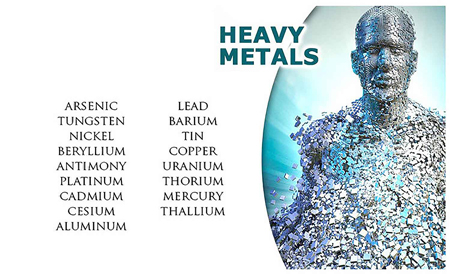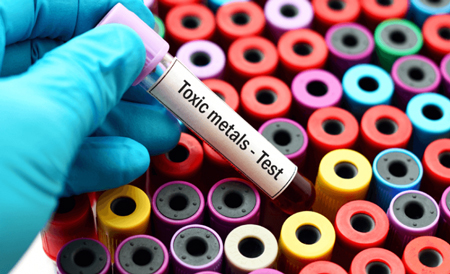How to Detox Heavy Metals to Help End Exhaustion and Chronic Fatigue (1)
by Dr. Mercola
Metals that are particularly detrimental to mitochondrial function include aluminum, arsenic, cesium, tin and thallium. Other toxic metals that many have in their bodies include cadmium, mercury and lead.
When you have heavy metal toxicity, you tend to attract EMFs to your body. EMFs in turn impact your body’s metabolism and ability to effectively eliminate toxins and heavy metals.

Excellent detoxification aids include a full spectrum low EMF infrared sauna together with sodium r-lipoic acid. Minerals such as magnesium, zinc, selenium, potassium and iodine are also important detoxification aids.
Detoxification is an important aspect of optimal health, but can be quite confusing, not to mention risky if done incorrectly. Wendy Myers, a functional diagnostic nutritionist, founder of MyersDetox.com and author of “Limitless Energy: How to Detox Toxic Metals to End Exhaustion and Chronic Fatigue,” is a treasure trove of information on this topic.
One key component many fail to take into consideration when detoxing is their exposure to non-native electromagnetic fields (EMFs) and microwave radiation from cellphones and Wi-Fi routers. Unless you address these exposures, your detoxification capacity may be impeded. In other words, your body may not be able to excrete heavy metals as efficiently as it would otherwise, due to the interference caused by EMFs.
EMFs Hinder Detoxification
As explained by Myers, when you have heavy metals in your body, you tend to attract EMFs to your body. EMFs in turn impact your body’s metabolism and functioning – and its ability to effectively eliminate toxins and heavy metals.
“That is one of the things I work with,” Myers says. “Identifying and trying to reduce EMF in [my clients’] environment, so they can improve their body’s ability to function generally and to detox.”
In my book, “Fat for Fuel: A Revolutionary Diet to Combat Cancer, Boost Brain Power and Increase Your Energy,” I detail a program to improve your mitochondrial function, and reducing your toxic burden is an important part of the equation. Your mitochondria will suffer as long as you bombard your body with EMF. In fact, EMF exposure itself is intrinsically a mitochondrial poison.
Professor Emeritus Martin Pall wrote an excellent paper explaining one of the primary mechanisms of harm from exposure to microwave radiation from cell phones. It is related to voltage-gated calcium channels. EMFs impact these calcium channels that release calcium into the cell.
Calcium causes nitric oxide release and combines with superoxide, thereby creating perioxinitrate, which is a massive producer of hydroxyl free radicals, the most destructive free radical known. Regular exposure to EMFs can actually poison your cells more than ionizing radiation from X-rays.
Common Metals That Wreak Havoc With Your Mitochondrial Function
Fatigue is a widespread problem today. “In doing my research, I was trying to figure out what is making us so tired,” Myers says. Eventually, she discovered a treasure trove of mitochondrial research and studies showing how various metals impact the mitochondria’s ability to produce adenosine triphosphate (ATP), the energy currency in your body. Metals that are particularly detrimental to mitochondrial function include:
• Aluminum, which is very prevalent in our environment, including the air we breathe, thanks to geoengineering. Aluminum is also found in many vaccines, and is used in water treatment plants to separate out sediments. It can be found also in antiperspirants, aluminum cans, foil and cookware are other common sources of exposure. Aluminum poisons enzymes transport nutrients into your mitochondria, impeding their ability to produce energy.
“When you remove aluminum and other mitochondrial poisons, we see a dramatic uptake in people’s energy levels, even people who are chronically fatigued or bedridden from their fatigue,” Myers says. “Within a year or so, they are able to start functioning again just from detoxing these metals”.
• Arsenic, found in antibiotics fed to conventionally-raised chickens and eggs, is another. To avoid arsenic, eat organic, pastured eggs and chicken. Rice is another common source, and Myers recommends avoiding brown rice for this reason. Other sources include wine, apple juice and drinking water.
• Tin affects your mitochondria a bit differently. The membrane of your mitochondria needs to have a certain charge to function properly. Tin dispels that charge, effectively handicapping the mitochondria. According to Myers, many have surprisingly high levels of tin in their bodies.
• Thallium, a gasoline additive, is a common air pollutant thanks to smog and car exhaust fumes. Thallium is added to gasoline for the same reason lead used to be added – to reduce knocking and improve engine performance. Lead was successfully removed from gasoline after public outcry, but now they add thallium instead. Few are aware of this, or understand its health effects, but thallium is a major factor in chronic fatigue.
There are a number of different ways to test for heavy metals, including hair, urine and stool. Certain metals, such as thallium, show up best in an urine dimercaptosuccinic acid (DMSA) challenge test. DMSA is a chelating agent that can be administered either orally or intravenously. When taken together with a synergistic agent like glycine, it binds to the metals in your body, forcing them out through your stool and urine.
Myers typically starts out doing a hair mineral analysis. It’s easy to do, relatively inexpensive and provides a significant amount of information. Ideally, you’ll want to do all three – hair, stool and urine tests – as no one test is perfect. Some metals come out in hair, others in urine and/or stool. Cadmium, for example, comes out in stool, so a stool test will be the most accurate.
“A lot of people have cadmium toxicity, so it’s very important to measure that,” Myers says. “A lot of people have mercury fillings, so we’ll see a lot of silver from those amalgams coming out in the stool as well. Those kill gut bacteria and cause gut dysbiosis. Other metals prefer to be excreted in the hair. That’s why I’d like to use all those different tests.”
No One Is Exempt From Heavy Metal Toxicity

I did a heavy metal analysis on hair, urine and stool, and despite leading a fairly clean lifestyle, I had every single one of these heavy metals in my body. So, I’m currently doing Myers’ detoxification program myself. While some believe detoxification is unnecessary and view such recommendations with suspicion, I believe accumulation of toxins is an unfortunate artifact of living in the XXI century. You’re continually exposed, so not only might you need to go through an aggressive detoxification program, but then you need to have some form of maintenance program to keep up with the continuous exposures.
“Yes, that’s my main message to people,” Myers says. “You should think of detox as a lifestyle, not something that you’re doing for 30 days, six months or even a year. It’s just something that you incorporate into your healthy lifestyle. We’ll talk about some of the supplements and detox protocols that you can do to facilitate that.
I’m always surprised that my healthiest clients, like yourself, have a lot of metals coming out. Your body is working really well. You’re very healthy, so your body is able to excrete these metals much better than someone who is sick or their detox organs aren’t functioning very well. But no one is exempt. Everyone has toxic metals in their body that we want to tend to if we plan to live a long, healthy, energetic and disease-free life.”
Indeed, because I lead such a healthy lifestyle, I thought I was somewhat immune to this kind of toxicity. I now suspect my arrogant ignorance of EMF exposure sabotaged my body’s ability to excrete these toxins. Now, I’m extremely diligent about avoiding EMF exposures, and I believe it’s having a positive effect.
Unfortunately, virtually no one, not even most detox experts, understand the EMF issue. I’m trying to change that by starting a dialogue about it. Because you can implement all of these detox strategies, but if you don’t radically reduce your EMF exposure, you’re merely spinning your wheels, investing time, energy and resources while limiting any potential benefit.
Near – Versus Far-Infrared Saunas
Saunas are an excellent detoxification tool, and Myers is one of the few clinicians who actually understands the difference between regular infrared saunas, which use far-infrared and the near-infrared. Far-infrared helps accelerate removal of toxins through sweat, but near-infrared, in the range of 830 to 850 nanometers (nm) is especially important for improving mitochondrial function.
Delivering near-infrared light to the compromised mitochondria synthesizes gene transcription factors that trigger cellular repair. So, ideally, you’ll want to use a full-spectrum sauna. At present, those are hard to find, but you can modify your far-infrared sauna by adding a near-infrared light in the 830 to 850 nm range to it.
Myers explains: “Infrared saunas are one of the best ways to detox your body. I recommend them to all my clients. [T]he most common sauna is a far-infrared sauna, I’m a big fan of near-infrared saunas also.
There are near-infrared bulbs saunas, which are fine for detoxification, but you want to add more concentrated near-infrared energy. You can do that with near-infrared light emitting diodes (LEDs). The best detox combo is a far-infrared sauna with a near-infrared LED and a red LED panel inside of it. That’s the best combo.”
Read the second part of this article
yogaesoteric
September 6, 2019
